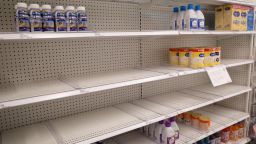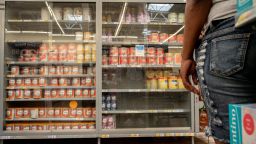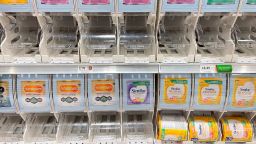Abbott Labs said Friday that it is recalling certain lots of 2 fluid ounce/59 milliliter bottles of Ready-to-Feed liquid formula for infants and children due to a problem with the bottle caps on some bottles that may not have sealed completely and could result in spoilage.
If a child were to consume spoiled formula, the company said, it could cause stomach problems such as vomiting or diarrhea.
A company spokesperson told CNN that the recall involves “less than a day’s worth” of the total infant formula used in the US and should not affect the overall supply.
This formula was manufactured in Columbus, Ohio, not at Abbott’s plant in Sturgis, Michigan, that was the focus of a large recall in February that exacerbated a shortage of baby formula, leading to ongoing problems.
The recalled brands include Similac, Pro-Total Comfort, Similac 360 Total Care, Similac 360 Total Care Sensitive, Similac Special Care 24, Similac Stage 1, Similac NeoSure, Similac Water (Sterilized) and Pedialyte Electrolyte Solution.
Most of these products are distributed primarily to hospitals and doctors’ offices.
The recall does not include any other liquid or powder formula brands or other nutrition products produced at Abbott’s Ohio facility or any other manufacturing location.
Affected lot numbers are listed on the website similacrecall.com. If a consumer has one of the recalled products, they should not feed it to their child, the company said.
“We take our responsibility to deliver high-quality products very seriously,” Joe Manning, Abbott’s executive vice president of nutritional products, said in a news release. “We internally identified the issue, are addressing it, and will work with our customers to minimize inconvenience and get them the products they need.”
Abbott’s Sturgis plant was shuttered for months after an FDA inspection found Cronobacter sakazakii bacteria, which can be deadly to infants, in several areas. Similac, Alimentum and EleCare powdered infant formulas made at the plant were recalled, and the closure exacerbated shortages caused by supply chain disruptions. Families across the United States have struggled for months to find formula for infants and for people with specific nutrition needs.
Get CNN Health's weekly newsletter
Sign up here to get The Results Are In with Dr. Sanjay Gupta every Tuesday from the CNN Health team.
Production had been underway for less than two weeks before a storm and flooding in July prompted officials to close the plant again. It was restarted in August.
The Biden administration’s Operation Fly Formula efforts have brought in millions of pounds of imported formula to help with the shortage.
Stock rates for formula have gotten much better, but they are still not back to typical levels before the shortage, according to market research firm IRI.




